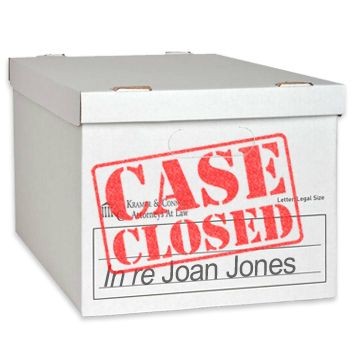The Lawyer's Lawyer
Lawyers Helping Lawyers Avoid the Perils of Professional Discipline
Hoarding Closed Client Files
Q. In 25 years of practice, I've never thrown anything away. But I'm moving to a smaller office without much storage space. May I toss my closed client files?
A. In deciding when to discard a file, one must consider an important corollary to Murphy's Law: The need for an old document will likely arise only after it is destroyed.
Some states have adopted document retention rules requiring you to keep your files for five to seven years, but most do not specify. Rather than provide precise guidance, the Rules of Professional Conduct in most jurisdictions require lawyers to "take steps to the extent reasonably practicable to protect a client's interests, such as ... surrendering papers and property to which the client is entitled." Rule 1.16 allows a lawyer to "retain papers relating to the client to the extent permitted by other law," but doesn't tell us when we may throw them away.
Some states have adopted document retention rules requiring you to keep your files for five to seven years, but most do not specify. Rather than provide precise guidance, the Rules of Professional Conduct in most jurisdictions require lawyers to "take steps to the extent reasonably practicable to protect a client's interests, such as ... surrendering papers and property to which the client is entitled." Rule 1.16 allows a lawyer to "retain papers relating to the client to the extent permitted by other law," but doesn't tell us when we may throw them away.
Most jurisdictions have rules requiring the attorney to maintain records pertaining to their trust accounts and to other client "property" for a specified period after representation ends. For example, in Maryland and the District of Columbia, one must maintain such records for five years. Although it's unclear whether these provisions apply to other client files, at least one ethics committee has read them broadly enough to do so.
No jurisdiction forces us to keep client files forever, but we should heed Mr. Murphy's warning to safeguard records that clients may need in the future:
In homage to Mr. Murphy, you'll want to store these records for more than "a few years." Most lawyers keep them for at least five years, while the true hoarders among us never throw a file away. Even when you do, it's important to review each file to identify any documents you may wish to hold onto even longer.
Unfortunately, every closed case leaves a legacy of paperwork for which we will never be compensated, and storage costs we will never recoup. But this is the cost of doing business as a private practitioner.
No jurisdiction forces us to keep client files forever, but we should heed Mr. Murphy's warning to safeguard records that clients may need in the future:
▸ Original Instruments Conferring Rights on Your Client - stock certificates, original contracts and deeds, settlement agreements, and negotiable instruments should be sent to the client once you conclude representation, or otherwise stored. If you can't find the client, escheat laws may let you transfer certain valuable instruments to the state itself. If the instrument is an original will, the register of wills will store it for you for a very nominal fee;
▸ Files on Potential Civil Claims - to be safe, maintain case notes, correspondence, pleadings, transcripts, exhibits and other evidence for a period well beyond the statute of limitations on the claim. For minors, remember that limitations will not start running until after the child reaches the age of majority, which may be many years into the future. Of course, for your own sake, you certainly want to keep your files beyond one very important limitations period – the deadline for filing legal malpractice claims; and
▸ Cases Involving Continuing Jurisdiction - the statute of limitations won't stop a parent from seeking a modification of child support or a change of custody. Nor will it apply to injunctions which courts may modify if circumstances change. In these cases, trashing "old" evidence may hurt your client later on.
No matter where you practice, the best way to avoid future problems is to state your document retention policy at the start of representation. My retainer agreements contain the following language:At the conclusion of this matter, you will be entitled to receive copies of any documents relating to the legal services performed, excluding our internal accounting records and other documents belonging to us. We have the right to retain copies of any documents or papers provided to you. Although we retain certain documents for a few years after closing a file, and some electronically stored records may be retained indefinitely, others may be removed from the file and destroyed at an earlier time. Accordingly, if you wish to obtain copies, please advise us promptly at the conclusion of your case.
In homage to Mr. Murphy, you'll want to store these records for more than "a few years." Most lawyers keep them for at least five years, while the true hoarders among us never throw a file away. Even when you do, it's important to review each file to identify any documents you may wish to hold onto even longer.
Unfortunately, every closed case leaves a legacy of paperwork for which we will never be compensated, and storage costs we will never recoup. But this is the cost of doing business as a private practitioner.
